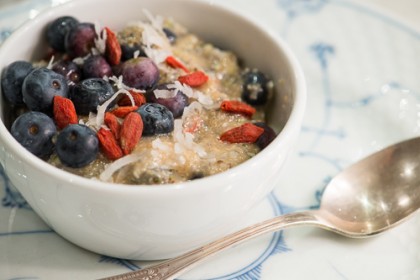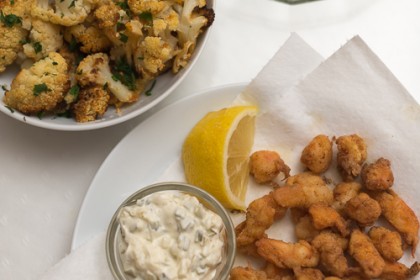Carrageenan (also known as irish moss) is an ingredient added by food scientists to make processed foods more palatable. It’s in everything from Tasti D-Lite soft serve ice cream to Applegate Farms Organic Roast Turkey Breast. It’s added to processed foods by food scientists to thicken or emulsify or prevent ice crystals from forming. I wasn’t concerned about it’s presence in so many of the foods in my kitchen because it is made from seaweed and we don’t have a problem with it. Then I started speaking with people about their reaction to processed foods containing carrageenan–all had digestive symptoms that continued on a gluten free diet. All spoke to me about how they didn’t have the same digestive problems with less processed versions of the same food. One reacted to Almond Breeze almond milk but not to homemade almond milk. Another person reacted to Applegate Farms turkey but not roasted turkey.
There may be soon be a scientific explanation for these reactions to Carrageenan. The American Journal of Physiology published an article by researchers in the Department of Medicine at the University of Illinois which said “exposure of human intestinal epithelial cells to carrageenan triggers a distinct inflammatory pathway…the study findings may represent a link between genetic and environmental etiologies of inflammatory bowel disease.” 1 Interestingly, rats also had an extreme reaction to carrageenan and developed bloody diarrhea. 2
Still, like gluten, carrageenan is everywhere and avoiding it means avoiding a lot of processed foods including most ready made milk substitutes–Silk Soy Milk, Almond Breeze and Whole Foods 365 Organic Ricemilk all use carrageenan as a thickener. It is also an ingredient in most ice creams. If you have digestive issues, you can try to to tease out if you are having a reaction to this additive by comparing how you feel after eating a less processed food (like fresh turkey) with a processed version (Applegate Farms organic roasted turkey breast.) Or avoid processed food completely for a week then load up on food with this ingredient to compare how you do.
Not everyone is sensitive to carrageenan-it might be a subgroup of people who reacts to this additive. Our family has never had a reaction to carrageenan, but anecdotally, I know a lot of people who are sensitive to gluten who react to carrageenan so it is something to think about if you continue to have digestive issues on a gluten free diet.
Once again, homemade is best whenever possible–especially if you are still having chronic symptoms.
1. http://ajpgi.physiology.org/content/292/3/G829.full
2.http://www.plosone.org/article/info:doi%2F10.1371%2Fjournal.pone.0008666




Me - My husband used to work in a lab and he used carrageenan to induce cells to become cancerous in a petri dish.
Jnc - hi
food manufacturers add carrageenan to make low-quality food taste high-quality. take the thick, yummy cream off the top and use it to make delicious ice cream. then take the lower-quality cream off the bottom, thicken it up with carrageenan, and PRETEND it's ice cream. you can buy ice cream without carrageenan, and you'll taste a HUGE quality difference!!! Haagen-Dazs 5, or Gelato, are great options
carrageenan is a high source of glutamates. as in monosodium glutamate, or MSG.
your body reacts the same way to glutamates from other sources as it does to glutamate from MSG. food manufacturers are hiding glutamates in foods using carrageenan, yeast extract, hydrolyzed corn or wheat proteins, etc., but it's still MSG. glutamates are known to cause digestive symptoms like diarrhea, as well as headache, muscle weakness, and a host of other symptoms.
i am celiac, but i stay away from ALL food additives as well.
Anonymous - I am trying to go gluten and dairy free and last night drank almond/coconut milk and had difficulty breathing, increased mucus in respiratory, etc. I looked at the ingredients and it had carageean listed twice! I have always had issues with MSG so now will have to avoid this too. Makes me wonder if our food supply is really getting polluted or it is just a small group that is becoming sensitive.
Jnc - our food supply is getting *really* polluted with glutamates. you can read about it at msgtruth.org (i have no affiliation but i learned a lot there). good luck and hope you feel better!
Vanessa - I sent an inquiry to Trader Joes and asked them why they see carrageenan in thei almond milks when it was linked with cancer. The response I got was that carrageenan is safe when it is who's foods based and not chemically altered. I'm not sure about this, does anyone know?
Vanessa - Ok sorry for the typos
When the USE carrageenan
WHOLE foods based
Jnc - here's my two cents regarding carrageenan and cancer:
the carrageenan that causes cancer is a low-molecular-weight form of carrageenan. its polymer chains have been shortened chemically.
high-molecular-weight (long-chain) carrageenan supposedly does not cause cancer.
so food manufacturers put high-molecular-weight carrageenans in our foods and call it "safe."
i have several concerns about this.
1 – can we be sure that our stomach acids do not break down the high-molecular weight carrageenans into shorter chains while they are in our body? i'd hate to think i'm eating the "safe" carrageenan and then letting my body convert it into the "unsafe" version. i'm an organic chemist, and i know that most polymers (including proteins like carrageenan) are susceptible to having their chains shortened by acids. like stomach acid.
2 – if we do trust that long-chain carrageenans are "safe," then we are trusting the production processes of whatever manufacturing plant makes the carrageenan. but if their temperatures or pressures are off just a bit, they could easily be producing short-chain carrageenans instead of long-chain. this could go straight into our food supply. do we really trust them to a) notice, and b) report mistakes?
3 – carrageenan is clearly not "safe" for me, as it gives me migraines and diarrhea. so i'm not eating it regardless of my cancer risk.
Anonymous - This is the first blog I have read that warns celiac folks (and gluten sensitive for that matter) that if they are continuing to have symptoms to eliminate foods with carrageenan. (Whole Foods is well aware of this issue and is working to eliminate it in their 365 brands – their almond milk is now "CF" as I call it – and they are working on soy, coconut, rice, et al.) The original, natural brand of Breyers is also safe for those searching for an ice cream – but the creamy versions contain carrageenan so read that label carefully! The real issue is that the dairy suppliers are delivering their creams to ice cream manufactures with the carrageenan in it even to local ice cream makers. One manager at Unos noted to me he can eat cheese, yogurt, drink milk, but always gets sick from ice cream…told him to try some brands without the seaweed/carrageenan…I am amazed that more GI docs to not know this and warn their patients!
I made this connection to carrageenan with gluten-like symptoms when I had been symptom free for months on my GF program, feeling great and then made my kids some pudding and homemade whip cream-both the packaged pudding and liquid whipping cream contained it…some internet searches and I discovered that it was likely the carrageenan – and accidental partaking it down the line confirmed it.
To continue this circle I reacted to a can of Eden beans from Whole Foods-what was in it? You guessed seaweed-brown kombu type…so when the holistic docs and Dr. Oz note munching on seaweed to decrease joint inflammation – I get not only GI symptoms that are gluten-like in nature but also joint and back pain…To complete this circle I reacted to some low salt chicken broth that had monoammonium glutamate – a close relative of MSG that was originally derived from seaweed during and after WWII…
So here is my theory as my symptoms with carrageenan/seaweed/MSG and its derivative are not solely GI oriented but are inflammatory joint/muscle as well – that it is the inner protein core of the seaweed that contains the gluten proteins…I am working to get some researcher to do an amino acid sequence on the 2-3 red seaweeds used to make carrageenan…one researcher with a major celiac group said they must have done this sequencing in checking for other substances with gluten (though he never confirmed they had checked major seaweeds species used in our food supply) and that I likely was responding to the complex polysaccharide of the seaweed – which would make sense if a)I had issues with other complex (non-gluten containing) plant foods or b) I only had GI symptoms…
This research to see if the seaweeds in our foods have a similar AAA sequence to the gliadins & glutenines is the key to getting this crap out of our foods.If we can say it is gluten-containing…manufacturers will have to list it as such and watch how fast it will come out of our processed foods!
Anonymous - Thank you so much for this information. I am newly diagnosed with Celiac Disease and finding I am sensitive to more than just gluten and its derivatives. I was reviewing the ingredients of Fit Freeze which the promoter is claiming it's healthy yet I had to go to another website (not his ad) to find out the ingredients. Full of lots of things I would not eat nor should anyone.
Anonymous - The Cornucopia Institute just released a report compiling the scientific evidence linking the food additive carrageenan to gastrointestinal inflammation and disease. The press release and report are available here: http://www.cornucopia.org/ and http://www.cornucopia.org/carrageenan-2013/. They're also asking people who cut carrageenan out of their diet and who noticed improvements in their gastrointestinal health to fill out an online questionnaire (http://www.cornucopia.org/carrageenan-questionnaire/), which is designed to assist medical researchers in better understanding the impact of carrageenan on public health.
janci - From recently posted research, up to 25% of the food-grade carrageenan was actually the low-molecular-weight (unsafe) carrageenan. ugh.
"As the
carrageenan manufacturers have shown in
their Round Robin analysis of degraded
carrageenan content in food-
grade carrageenan (Marinalg
Working Group report of
January 2006 ]Technical pos
ition on measurements rela
ted to meeting the EC
molecular weight distribution specificat
ion for carrageenan and
PES), up to 25%
carrageenan of molecular weight less t
han 50,000 was measured in the food-grade
carrageenan that was tested. Other
research has indicated that
acid digestion, heating,
bacterial action, and mechanical processing
can increase the amount of degraded
carrageenan obtained from higher molecular
weight carrageenan."
Read more of the research here. http://www.cornucopia.org/DrTobacmanComment_toNOSB.pdf
janci - another important excerpt: "we have found
convincing evidence that carrageenan activates biologically significant pathways. Some
of the effects of carrageenan are related to 1) activation of reactive oxygen species, 2)
reduction in activity of sulfatase enzymes, and 3) ACTIVATION OF GENES INVOLVED IN CARCINOGENESIS."
(emphasis mine. note: carcinogenesis = initiation and growth of cancer cells.)
Anonymous - wow, this is eye opening! does all seaweed that you buy at Trader Joes, Whole Foods, Costco, etc. include carrageenan or only specific types of seasweed (e.g., red)?
Docizn - I wrote to Publix about their use of carrageenan in their yogurt , telling them that it was a known cancer causing agent and I found it to be an unconscionable act that they added this to their otherwise great products. I never received a reply back!